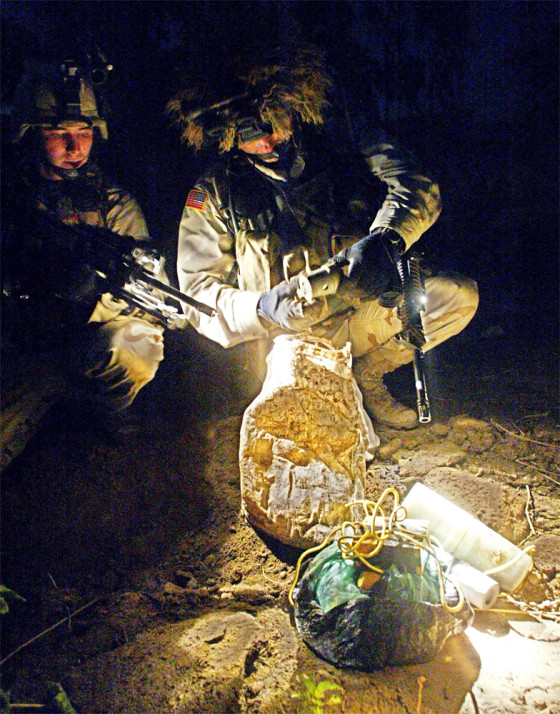U.S. troops on Thursday seized three Iraqi men suspected of heading guerrilla cells in Saddam Hussein’s hometown, and said they had uncovered a weapons cache with enough ammunition to launch a string of attacks.
In the garden of one of the two houses raided in Tikrit, 110 miles north of Baghdad, soldiers dug up a hoard of rifles, grenades and explosives that they said were used by members of Saddam’s Fedayeen militia to mount attacks.
Lieutenant Colonel Steve Russell, commander of the U.S. 4th Infantry Division’s 1-22 Battalion which carried out the raid, described the haul as a “Fedayeen candy shop.”
In Baquba, also located in the “Sunni triangle” where much of the resistance to the U.S.-led occupation is concentrated, U.S. troops and Iraqi police raided several buildings, arrested 16 men and seized 28 Kalashnikov rifles and bomb-making equipment.
Shortly after the raid, a grenade was thrown from one of the buildings, wounding a U.S. soldier. Troops went back in and arrested two more suspects after the attack.
Since the start of the war to oust Saddam, 310 U.S. soldiers have been killed in action, 195 of them in guerrilla attacks since major combat was declared over on May 1.
Two soldiers were killed in separate attacks in Mosul on Wednesday, bringing to four the number of U.S. troops killed in the northern city in the four days since Sunday.
Apache down
A U.S. Apache helicopter came down south of Mosul on Wednesday, although its crew of two escaped without major injuries. The American military initially said the Apache made a controlled landing after a technical malfunction, but later said it could not rule out the helicopter had been shot down.
“It could have been a mechanical failure but we are looking at all possibilities and the aircraft is being recovered,” Brigadier General Frank Helmick told reporters.
Asked whether the helicopter could have been shot down, he said: “We don’t know, it is under investigation.”
In the town of Lutafiya, south of Baghdad, U.S. soldiers staged 18 raids on Wednesday, arresting 41 people in connection with the killing of seven Spanish intelligence officers in an attack on their convoy last month.
“Those captured included the cell leader Abu Abdullah, an intelligence officer, financier, and a doctor who treated terrorists so they can avoid treatment at local hospitals, and the actual attackers,” a U.S. Army statement said.
Attacks on troops, contractors and diplomats from countries backing the United States in Iraq have added to domestic public pressure in many nations to pull out of the mission.
This week, Washington announced that bids for $18.6 billion worth of Iraqi reconstruction contracts would be limited to firms from countries that backed the war, freezing out companies from France, Germany, Russia and China.
The move sparked widespread anger.
“The U.S. decision is gratuitous and extremely unhelpful,” European Union External Relations Commissioner Chris Patten said on Thursday. “We should be seeking to bring people together, not divide them.”
The European Commission, which conducts the bloc’s common trade policy, has said it will check whether the U.S. decision violates World Trade Organization rules.
